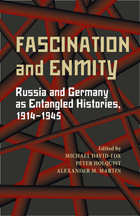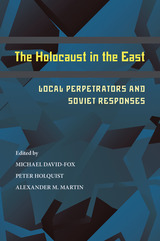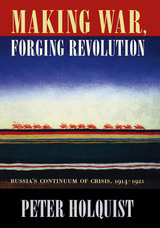
Fascination and Enmity presents an original transnational history of the two nations during the critical era of the world wars. By examining the mutual perceptions and misperceptions within each country, the contributors reveal the psyche of the Russian-German dynamic and its use as a powerful political and cultural tool.
Through accounts of fellow travelers, POWs, war correspondents, soldiers on the front, propagandists, revolutionaries, the Comintern, and wartime and postwar occupations, the contributors analyze the kinetics of the Russian-German exchange and the perceptions drawn from these encounters. The result is a highly engaging chronicle of the complex entanglements of two world powers through the great wars of the twentieth century.

Since its founding, the journal Kritika: Explorations in Russian and Eurasian History has led the way in exploring the East European and Soviet experience of the Holocaust. This volume combines revised articles from the journal and previously unpublished pieces to highlight the complex interactions of prejudice, power, and publicity. It offers a probing examination of the complicity of local populations in the mass murder of Jews perpetrated in areas such as Poland, Ukraine, Bessarabia, and northern Bukovina and analyzes Soviet responses to the Holocaust.
Based on Soviet commission reports, news media, and other archives, the contributors examine the factors that led certain local residents to participate in the extermination of their Jewish neighbors; the interaction of Nazi occupation regimes with various sectors of the local population; the ambiguities of Soviet press coverage, which at times reported and at times suppressed information about persecution specifically directed at the Jews; the extraordinary Soviet efforts to document and prosecute Nazi crimes and the way in which the Soviet state’s agenda informed that effort; and the lingering effects of silence about the true impact of the Holocaust on public memory and state responses.

Offering a fundamental reinterpretation of the emergence of the Soviet state, Peter Holquist situates the Bolshevik Revolution within the continuum of mobilization and violence that began with World War I and extended through Russia's civil war. In so doing, Holquist provides a new genealogy for Bolshevik political practices, one that places them clearly among Russian and European wartime measures. From this perspective, the Russian Revolution was no radical rupture with the past, but rather the fulcrum point in a continent-wide era of crisis and violence that began in 1914.
While Tsarist and Revolutionary governments implemented policies for total mobilization common to other warring powers, they did so in a supercharged and concentrated form. Holquist highlights how the distinctive contours of Russian political life set its experience in these years apart from other wartime societies. In pursuit of revolution, statesmen carried over crisis-created measures into political life and then incorporated them into the postwar political structure. Focusing on three particular policies--state management of food; the employment of official violence for political ends; and state surveillance--Holquist demonstrates the interplay of state policy and local implementation, and its impact on the lives of ordinary citizens. Making War, Forging Revolution casts a new light on Russia's revolution and boldly inserts it into the larger story of the Great War and twentieth-century European history.
READERS
Browse our collection.
PUBLISHERS
See BiblioVault's publisher services.
STUDENT SERVICES
Files for college accessibility offices.
UChicago Accessibility Resources
home | accessibility | search | about | contact us
BiblioVault ® 2001 - 2024
The University of Chicago Press









